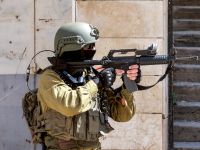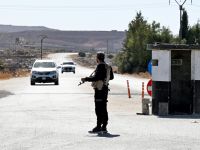Israel officially blamed Hizbullah on Friday for the shooting attack south of the border earlier in the week, which left six Israelis dead.
Israeli Defense Minister Binyamin Ben-Eliezer also drew Syria into the fray, claiming it had supported the attack. Foreign Minister Shimon Peres claimed it was an “attempt by Hizbullah, Syria and Iran to start an escalation … in order to sabotage the Beirut summit and the Saudi initiative,” a reference to Crown Prince Abdullah’s land-for-peace offer.
Hizbullah has categorically denied any role in Tuesday’s attack near the town of Shlomi in the Galilee, only 2 kilometers south of the border.
Lebanese officials have since gone to great lengths to deny the attackers had crossed the border for a guerrilla attack. Indications that the attackers might have come from Lebanon first surfaced on Thursday, when Israeli military sources said that a ladder found abandoned at the border fence was apparently used by the assailants to climb over a fence Israel had erected after its May 2000 withdrawal from south Lebanon.
Security and diplomatic sources on Friday told The Daily Star that it was possible that the border was breached at the locations where the Israelis claim they found the ladder. “It was a very well chosen spot to cross from,” one security source said. “It’s an area where the fence runs south of the Blue Line and in the middle of a minefield.”
UNIFIL peacekeepers have no access to that area, as their patrols are restricted to the Blue Line, which was marked by the United Nations after the Israeli withdrawal. The security source also suggested that Shlomi was too far a target for the Palestinians to reach.
Diplomatic sources disclosed that the US Ambassador Vincent Battle told Foreign Minister Mahmoud Hammoud on Thursday, well before news of the ladder spread, that he had received information that the attackers had come from Lebanon.
Hammoud reacted angrily, and told the ambassador that the United States always endorsed Israel’s views, insisting that there was no evidence to suggest Lebanese involvement. The sources described the meeting as “heated,” adding that Hammoud asked the ambassador to avoid accusatory statements when he briefs reporters.
Other Lebanese officials also insisted that Israel was casting allegations to tarnish Lebanon’s image. On Friday, Defense Minister Khalil Hrawi contacted UNIFIL commander Major General Lalit Mohan Tewari for a second time this week to inquire about the Israeli allegations. Tewari replied that UNIFIL “is in no position to confirm or deny this finding,” referring to the ladder.
“I am keeping New York updated and if the Lebanese authorities have anything from their side, I will be glad to take note of that,” he said, according to sources close to commander.
“The story concocted by Israel and published today concerning the perpetrators of the attack climbing over a fence on a ladder is not based on facts and is accordingly completely unfounded,” Hrawi said in a statement later.
In turn, UNIFIL’s spokesman, Timur Goksel, said the swath of land along the border where the alleged infiltration took place did not fall under the mission’s supervision. “Accordingly, we are not in position to deny or confirm the report,” he added.
Information Minister Ghazi Aridi said the allegations were “just another way to exercise pressure (by the Jewish state) on Lebanon.” “We were surprised by an attempt to exert pressure (on Lebanon) and the leaking of information by certain diplomats who we wished were more objective … when Israel denies the report and a diplomat then accuses Lebanon, this raises many questions,” Aridi added, referring to Battle’s meeting with Hamoud.
For his part, Hizbullah’s secretary-general, Sayyed Hassan Nasrallah, in a speech on Friday, said it was “a great honor for us to be accused by Israel of backing our people in Palestine.” “All threats and intimidation we hear about will not frighten us or make us hesitate to carry out our duty,” he added, but denied that Tuesday’s attack was the work of his group.
Sultan Abul-Ainayn, Palestinian President Yasser Arafat’s Fatah movement commander in Lebanon, also affirmed that none of the factions in the country was involved in the attack.
“Resisting (Israeli) occupation is solely confined to Palestinians in Palestine. The enemy’s attempt to accuse the perpetrators of having come from Lebanon may be a justification to carry out a certain operation,” he said. (Albawaba.com)







